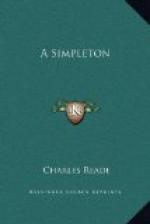He did so, and that gave Rosa a quarter of an hour to make her purchases. When he came back he found her conversing with Phoebe, as if they were old friends, and Dick glaring at his wife with awe and admiration. He could hardly get her away.
She was far more extravagant in her praises than Dr. Staines had been. “What a good creature!” said she. “And how clever! To think of her setting up a shop like that all by herself; for her Dick is only seventeen.”
Dr. Staines recommended the little shop wherever he went, and even extended its operations. He asked Phoebe to get her own wheat ground at home, and send the flour up in bushel bags. “These assassins, the bakers,” said he, “are putting copper into the flour now, as well as alum. Pure flour is worth a fancy price to any family. With that we can make the bread of life. What you buy in the shops is the bread of death.”
Dick was a good, sharp boy, devoted to his sister. He stuck to the shop in London, and handed the money to Phoebe, when she came for it. She worked for it in Essex, and extended her country connection for supply as the retail business increased.
Staines wrote an article on pure food, and incidentally mentioned the shop as a place where flour, milk, and butter were to be had pure. This article was published in the Lancet, and caused quite a run upon the little shop. By and by Phoebe enlarged it, for which there were great capabilities, and made herself a pretty little parlor, and there she and Dick sat to Falcon for their portraits; here, too, she hung his rejected landscapes. They were fair in her eyes; what matter whether they were like nature? his hand had painted them. She knew, from him, that everybody else had rejected them. With all the more pride and love did she have them framed in gold, and hung up with the portraits in her little sanctum.
For a few months Phoebe Dale was as happy as she deserved to be. Her lover was working, and faithful to her—at least she saw no reason to doubt it. He came to see her every evening, and seemed devoted to her: would sit quietly with her, or walk with her, or take her to a play, or a music-hall—at her expense.
She now lived in a quiet elysium, with a bright and rapturous dream of the future; for she saw she had hit on a good vein of business, and should soon be independent, and able to indulge herself with a husband, and ask no man’s leave.
She sent to Essex for a dairymaid, and set her to churn milk into butter, coram populo, at a certain hour every morning. This made a new sensation. At other times the woman was employed to deliver milk and cream to a few favored customers.
Mrs. Staines dropped in now and then, and chatted with her. Her sweet face and her naivete won Phoebe’s heart; and one day, as happiness is apt to be communicative, she let out to her, in reply to a feeler or two as to whether she was quite alone, that she was engaged to be married to a gentleman. “But he is not rich, ma’am,” said Phoebe plaintively; “he has had trouble: obliged to work for his living, like me; he painted these pictures, every one of them. If it was not making too free, and you could spare a guinea—he charges no more for the picture, only you must go to the expense of the frame.”




